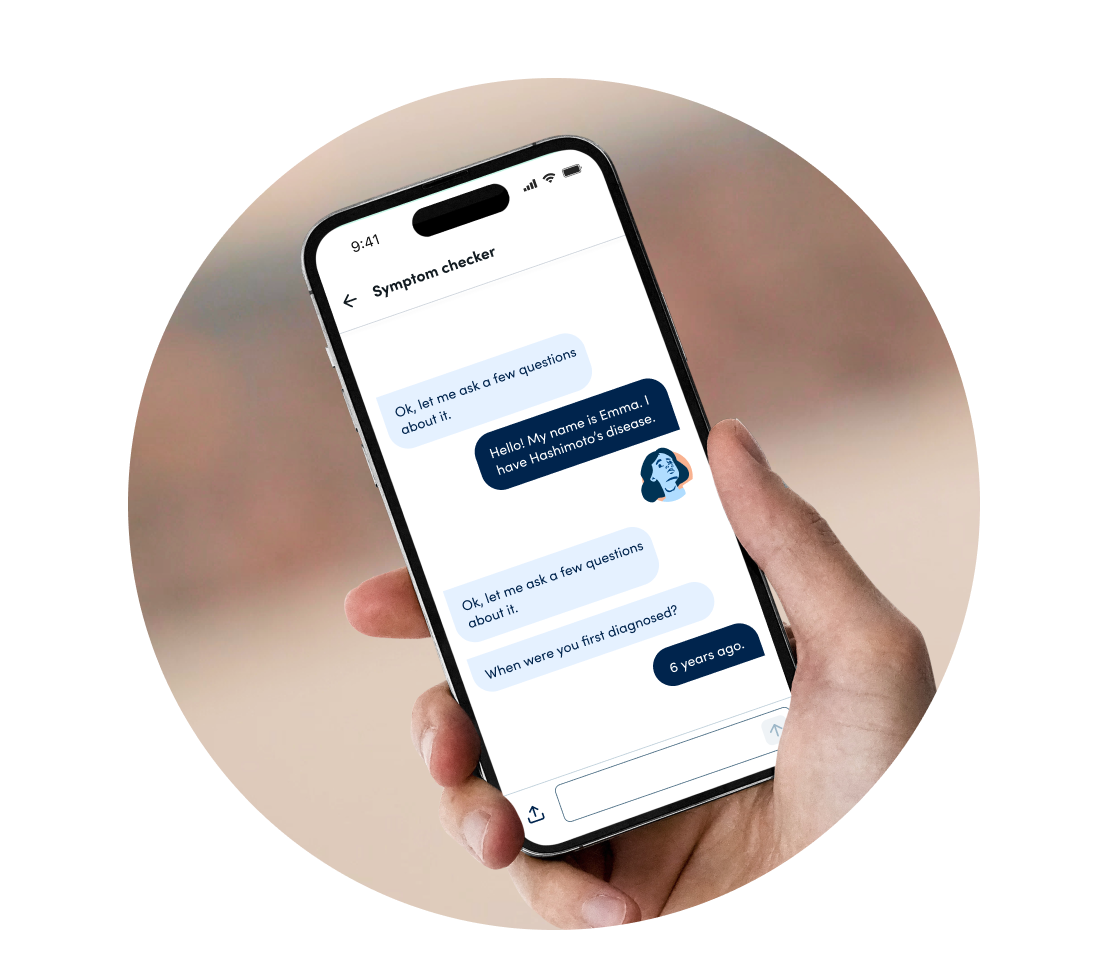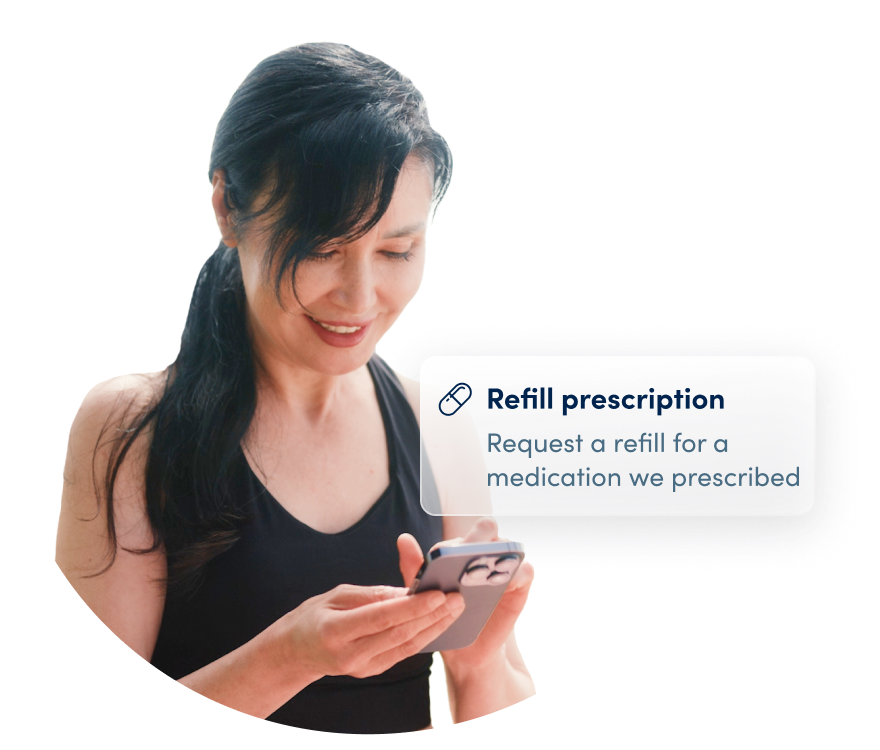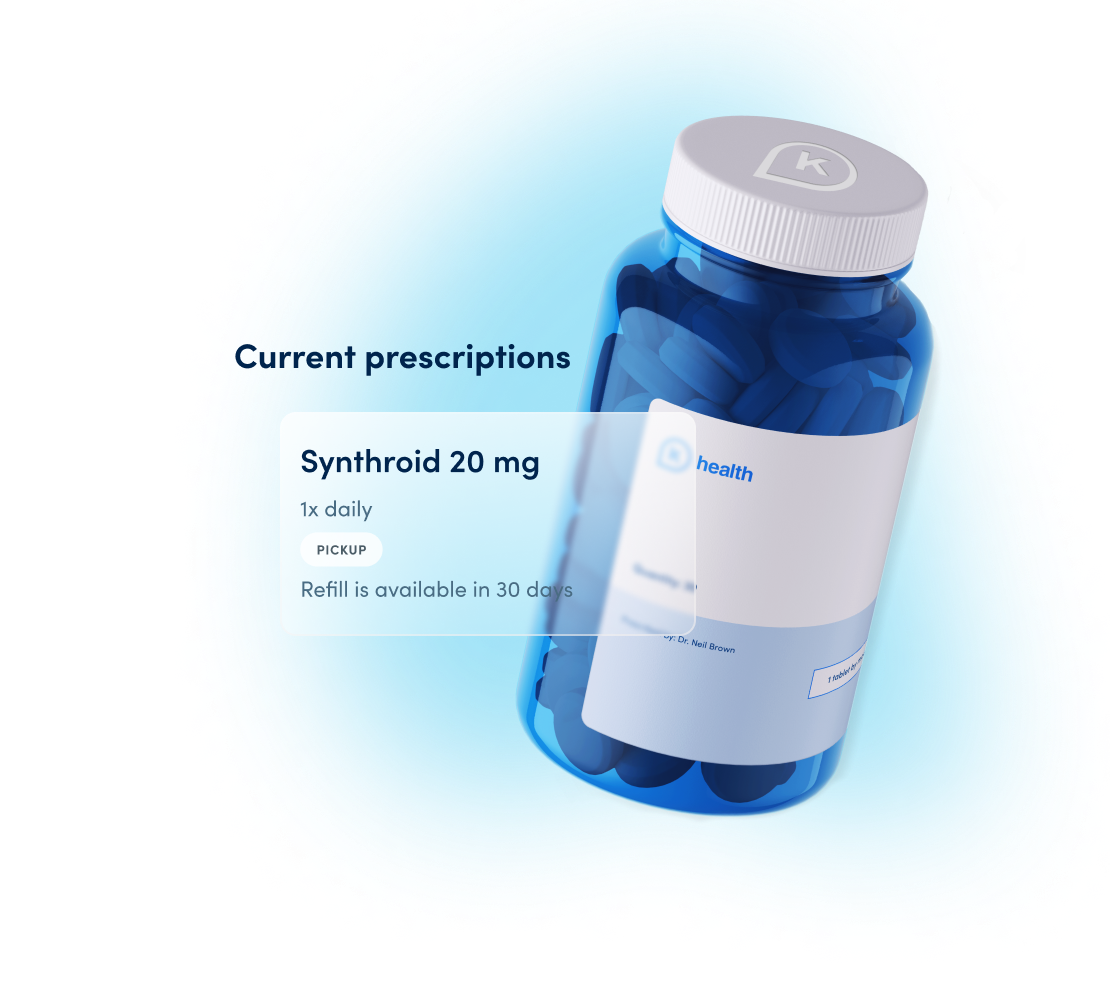TREAT HYPOTHYROIDISM ONLINE
Chat with a Primary Care doctor without leaving your house. Manage thyroid conditions and medications for only $49 for your first month.
HOW IT WORKS
Thyroid condition management made easy—all from your phone

Tell us about yourself
Our smarter, faster, virtual intake process gets your doctors the info they need to care for the whole you.

Get care on your schedule
Text us when you’re free—we make ourselves available day and night. For virtual check-ins, refills, and more.

Manage your health with ease
We’ll help you stick to your plan for managing a chronic disease*, changing a habit, and living healthier—by phone.
The advantages of Primary Care with K Health
See a provider without seeing a provider
Make a flexible appointment with a medical provider right from the app, as often as you want.
Feel good about feeling good
Manage chronic conditions, mental health, your weight, and more. Plus, generic meds come at a low price.
Get 24/7 Urgent Care, too
A K Health membership also includes unlimited virtual visits for medical issues that pop up suddenly.
Pay just $49 for your first month
After the first month, membership fees are billed in advance 3 months at a time, and you can cancel anytime until 1 day before your renewal date.
READ MORE
Hypothyroidism Treatment Online FAQs

What is hypothyroidism?
Hypothyroidism is a condition in which the thyroid gland doesn’t produce enough thyroid hormone. This hormone helps regulate the body’s metabolism. When levels are too low, the body’s processes start to slow down.
What are the symptoms of hypothyroidism?
Since the thyroid plays a big part in energy and metabolism, it can impact many body processes when not functioning correctly.
Symptoms vary from one person to the next. Over time, hypothyroidism symptoms can worsen and cause serious health problems.
The most common symptoms of hypothyroidism include the following:
- Fatigue
- Sleep problems
- Weight gain or inability to lose weight
- Cold intolerance
- Dry skin
- Brittle nails
- Dry, thinning hair
- Hoarse voice
- Sore throat
- Feeling a lump in the throat
- Trouble swallowing
- Muscle and/or joint pain
- Muscle weakness
- Puffiness in the face
- Constipation
- Hemorrhoids
- Heavy, irregular, or painful menstrual periods
- Fertility problems
- Depression
- Anxiety
- Slowed resting heart rate
- Reduced blood pressure
- Goiter (neck enlargement or tenderness from a swollen thyroid)
Approximately five of every 100 Americans have a hypothyroid condition, although some may have few or no symptoms. Hypothyroidism may develop over months or years. Symptoms may not be noticeable until the condition is severe.
What causes hypothyroidism?
Thyroid conditions like hypothyroidism are common and have many possible causes, such as:
-
- Hashimoto’s disease: an autoimmune condition where the immune system attacks the thyroid, reducing its ability to function properly; this is the most common cause in the U.S.
- Thyroiditis: Inflammation of the thyroid gland
- Radiation treatment: treatment for cancer or other conditions that uses radiation can damage the thyroid
- Thyroid surgery: removing all or part of the thyroid gland
- Congenital hypothyroidism: a birth defect that interferes with the development of the thyroid gland
- Pituitary gland disorders: the pituitary gland works with the thyroid to produce thyroid hormone, so any problems with the pituitary can impact the thyroid
- Iodine deficiency: not getting enough iodine in your diet, which is necessary for the thyroid to function properly
- Certain medications: taking certain types of drugs can interfere with the thyroid’s hormone production; examples include amiodarone and lithium
What are the risk factors?
Some people are at a greater risk of developing hypothyroidism than others. The most common risk factors include:
- Being born with a vagina
- Being over age 60
- History of goiter
- Family history of thyroid conditions
- Prior radiation treatment to the thyroid, chest, or neck
- Turner syndrome
- Sjogren’s syndrome
- Type 1 diabetes
- Type 2 diabetes
- Recent pregnancy or postpartum
- Pernicious anemia
- Lupus
- Rheumatoid arthritis
- Celiac disease
How are thyroid conditions diagnosed?
Laboratory tests and a physical examination are standard diagnostic tests for thyroid conditions. Some people discover their thyroid condition after routine lab work indicates their thyroid levels are out of range.
If you have symptoms, a healthcare provider may look at your neck, feel it, or order an ultrasound or other imaging tests. These tests help check for an enlarged thyroid or goiter.
The most common blood test used to diagnose hypothyroidism is the TSH (thyroid-stimulating hormone) test. The TSH test measures how much TSH is in the blood. If your TSH levels are high, your thyroid gland is not making enough thyroid hormone. Other blood tests help rule out conditions with similar symptoms.
Can an online doctor order labs for thyroid problems?
Most healthcare providers can order routine tests to check for thyroid function. Primary care providers, including those who offer online virtual visits, can order labs like thyroid stimulating hormone (TSH), T3, T4, and thyroid antibody blood tests.
Online doctors may send your lab orders to a specific clinic or lab in your area. Many give you a printable or electronic copy of your order to take to a lab of your choice.
What is the best treatment for hypothyroidism?
Hypothyroidism treatment typically involves thyroid hormone replacement therapy. Levothyroxine is a synthetic form of the hormone thyroxine (T4), which is what the thyroid gland normally produces. It’s the most common form of treatment and is generally very effective. However, it can take some time to adjust to the medication.
A healthcare provider will typically order blood tests every 6-8 weeks while you are adjusting to the dosage. Once the lab results show your thyroid hormone levels are appropriate, you will likely need less frequent lab tests—as long as your symptoms improve. Patients with hypothyroidism treated with levothyroxine may need laboratory testing every 6-12 months. Use caution with not mixing brand with generics for this condition. While generic medications are safe and effective, some generics can affect the patient differently.
Most patients who have an underactive thyroid respond well to thyroid hormone replacement. Even if you start feeling better, you should continue taking your medication as prescribed. Untreated hypothyroidism can lead to serious long-term health problems like osteoporosis and heart rhythm problems.
How can an online doctor treat thyroid disorders?
Online healthcare providers can treat and manage thyroid disorders like any other primary care provider. They can schedule regular appointments, order lab testing, and prescribe thyroid medications.
People who have thyroid disorders may need a referral to specialists, known as endocrinologists. K Health medical providers can refer patients to specialists and monitor primary care for hypothyroidism.
Can thyroid conditions be cured?
Hypothyroidism can be temporary, such as after having a baby. In many cases, it develops into a permanent condition. If hypothyroidism is caused by Hashimoto’s disease—an autoimmune attack of the thyroid gland—then it’s impossible to cure. However, there are treatments available to help manage the symptoms of autoimmune conditions.
Can an online doctor refill my thyroid medication?
If you’re being treated for hypothyroidism, primary care providers can provide follow-up care, including routine lab testing and necessary thyroid medication refills.
If you need a medication refill, you can use the K Health app to speak with a primary care provider. They will discuss your symptoms, order any required lab tests, and send thyroid prescription medication to your pharmacy. They may also adjust dosages and provide follow-up care based on lab test results.
Who can see an online doctor for hypothyroidism?
In many cases, hypothyroidism treatment is straightforward. An online primary care provider can treat adults with hypothyroidism.
Certain circumstances may require in-person care from a specialist, such as:
- Under age 18
- Pregnancy
- Undergoing fertility treatments or preconception care
- Heart disease or cardiovascular disorders
- Other endocrine disorders
- Drug-induced hypothyroidism
- Medical care for cancer or other chronic disorders
These conditions usually require multiple providers, such as an OBGYN, endocrinologist, reproductive specialist, or other experts. Because thyroid hormone can impact other medical treatments and outcomes, including fertility and pregnancy, online primary care may not be the most effective for your health.
If you have questions about managing hypothyroidism with an online doctor, use the K Health app to check your symptoms and chat directly with a primary care provider—from the comfort of your home.

Your K Health unlimited membership includes:
-
24/7 text-based Urgent Care
-
Flexible appointments for ongoing care
-
Low-cost generic meds delivered to your door
Avoid the stressful search for care
Join primary care
